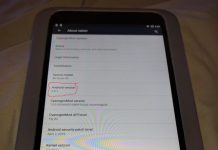 Ars Technica’s Ryan Paul has a look at three upcoming or recent Android e-book readers, including the Cruz Reader, the Pandigital Novel, and the SmartQ T7.
Ars Technica’s Ryan Paul has a look at three upcoming or recent Android e-book readers, including the Cruz Reader, the Pandigital Novel, and the SmartQ T7.
Velocity Micro’s Cruz Reader looks particularly impressive. Paul writes:
The device has a seven-inch color LCD touchscreen with a resolution of 800×600. It runs Android 2.0 and will come bundled with the Borders book store. Even though it is designed as an e-book reader, users will still have access to the underlying Android environment and will not have to hack the device in order to sideload and run other applications. Velocity Micro is selling the device for $199 and recently started taking preorders on its website.
Though it will not have the Android Market at launch, it will have a market of its own called the Cruz Market. Velocity Micro will also have a $299 device with better specs, called the Cruz Tablet.
On the other end of the quality spectrum, Wired’s Gadget Lab section has a look at a Chinese Android tablet called the “ePad”. As you might expect from the name, it’s a cheap knockoff of the iPad that turns out to be pretty bad.
Meanwhile, Johnny Evans at Computerworld has an interesting look at the assumptions surrounding the Android vs. iOS competition. One thing he points out is that competitors claim iOS’s “closed” nature will cause it to lose out to the more “open” Android. But on the other hand, if this were true than closed-source Microsoft Windows would not be the powerhouse that it is while open-source Linux commands only a tiny fraction of the market.
He also points out the privacy issues that are dogging Google lately, and suggests that Android handsets may be more intrusive than iOS devices. Finally, he notes that even as Google works on an even better Android 3.0, Apple continues to innovate further with future versions of its operating system. The predictions that the iPad will fall to 20% of the tablet market may simply be wishful thinking.






























When people talk about Android being “open” I think they mean that in the sense that any manufacturer can make an Android phone, as opposed to Iphones which are only from Apple. Using this definition Windows IS an open system, mac is the “closed” competitor. Any manufacturer that wants to can make a windows computer, but only Apple can make a mac. VHS was “open”-many manufacturers, whereas Betamax was “closed”-just Sony. Typically, format wars are won by an open format using this definition. Itunes vs. mp3s is a notable exception, probably due to the whole Napster-Kazaa-RIAA lawsuits fiasco.
It’s true that windows is not “open-source”, in the sense that the code is publicly available and free, but that’s not as important from a flood-the-market-with-generics competitive standpoint.
I should self-monitor here a bit before someone corrects me. In the classic VHS-Betamax feud I mentioned, BOTH companies offered to license the format to third party vendors. But VHS had more takers (and was more “open”) because their licensing fees were lower.
7 inch screen with 800 x 600 resolution isn’t something to get too excited about.